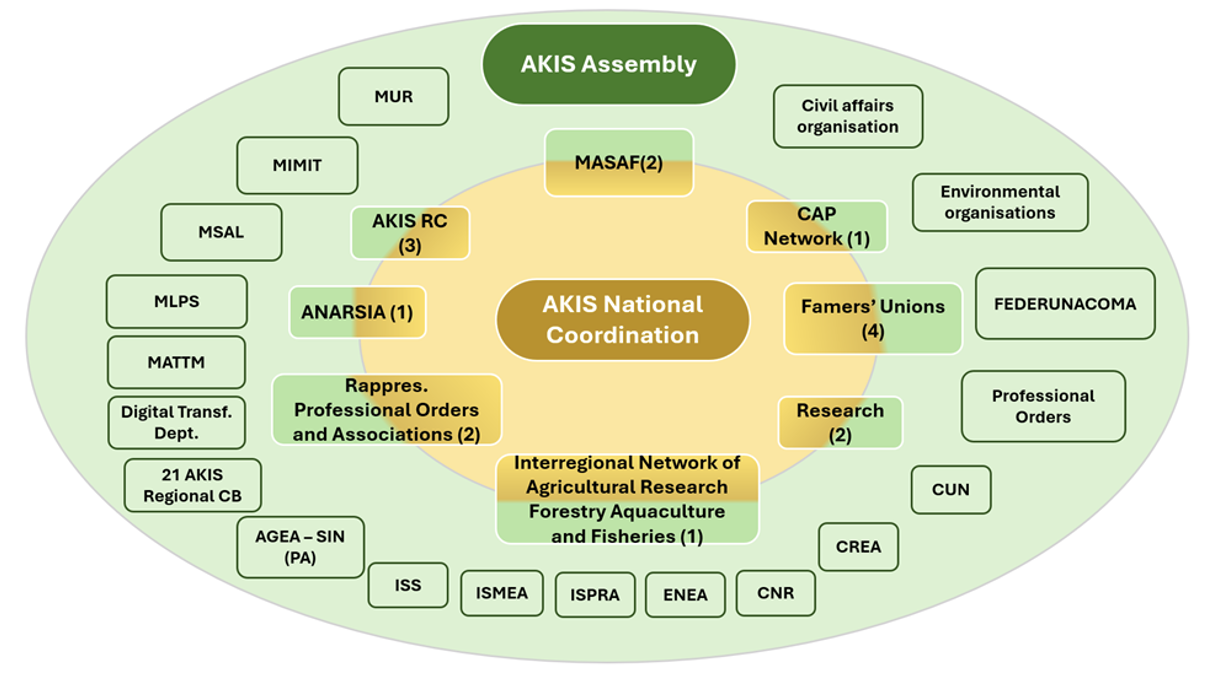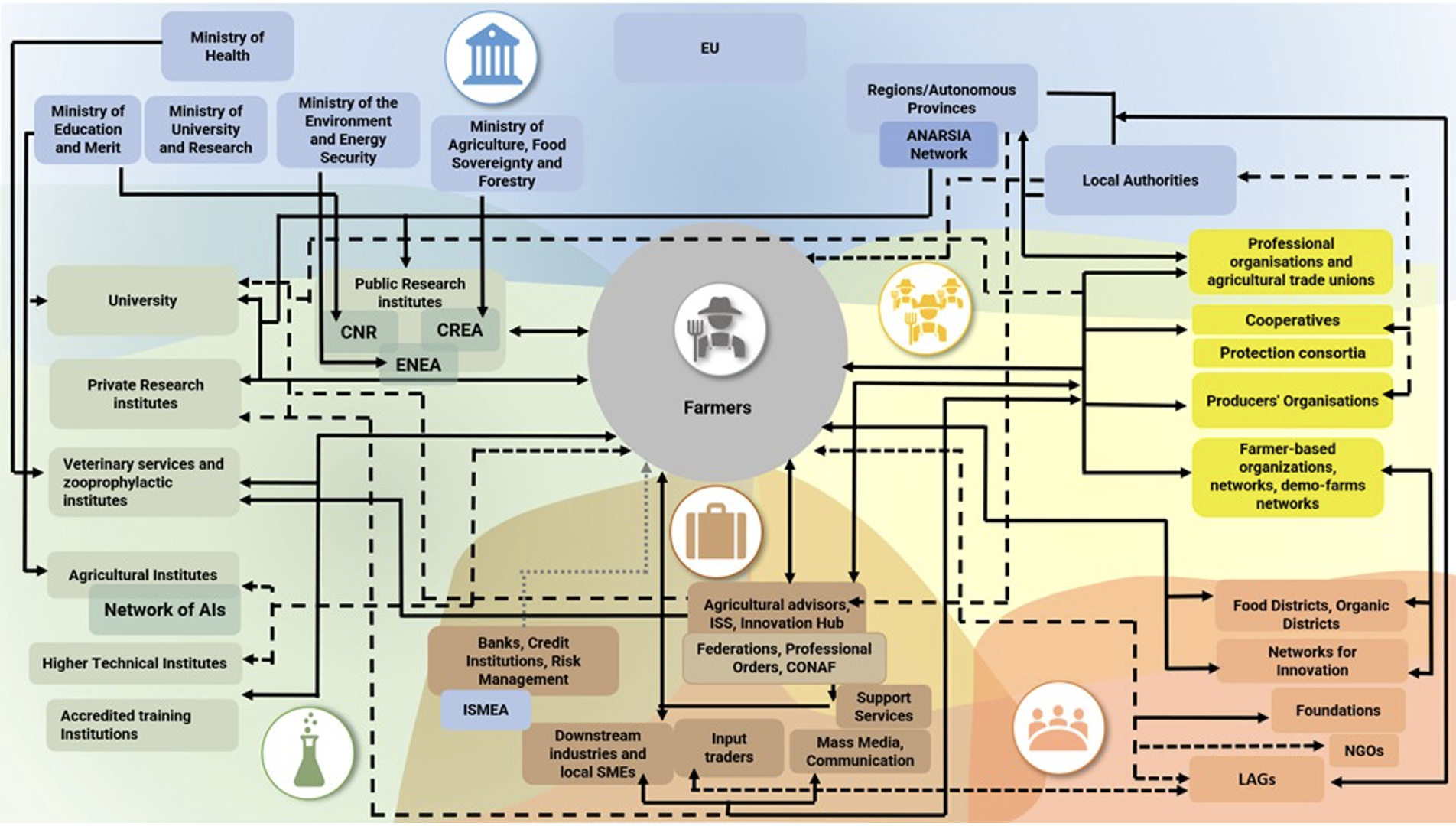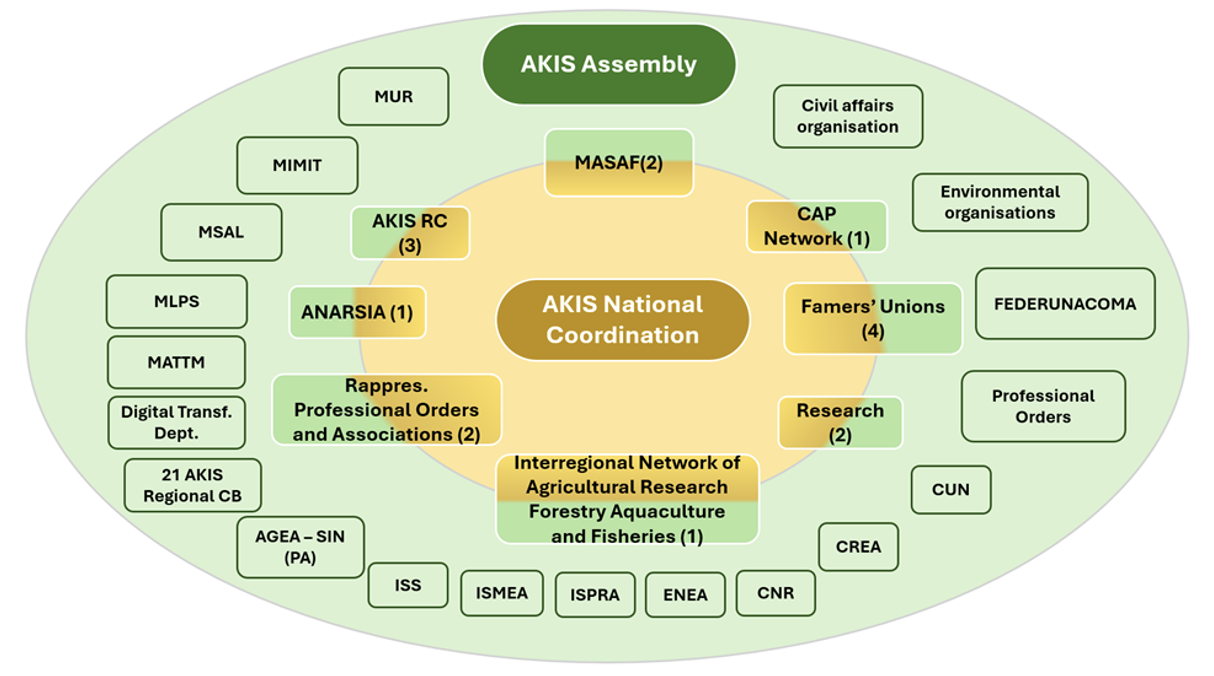2024
AKIS coordination bodies
governance

The Italian AKIS (Agricultural Knowledge and Innovation System) is a complex, multi-actor, and multilayered network encompassing numerous entities and governance levels. This structure involves a diverse range of stakeholders who, despite working in overlapping areas, bring specialized expertise to specific fields. The extent of cooperation and integration varies significantly, influenced by the types of actors involved, their regional affiliations, and the policy frameworks guiding them. Generally, local innovation initiatives—supported by past and current CAP funds, as well as local learning and innovation networks—have fostered and strengthened relationships among these varied actors, particularly enhancing collaboration between farmers, advisors, and the research community. At the national level, the Italian AKIS is closely interconnected with regional systems, facilitated by a network of actors and knowledge exchanges that often transcend national or regional boundaries. Typically, numerous organizations—both from the research sector (e.g., CREA, CNR) and the productive sector (such as farmers' unions)—are actively involved across both the national and regional AKIS networks, participating fluidly across these layers.
Figure 1: Italian AKIS Diagram

Source: i2connect AKIS country report (2024)
The political relevance given to AKIS strategies in the context of the CAP Strategic Plans (CAP SPs) 2023-2023 has certainly highlighted the opportunity of defining governance bodies aimed at coordinating the AKIS-relating interventions and actors in view of their better implementation and contribution to the cross-cutting and specific objectives of the CAP SPs.
Particularly, the AKIS coordination body is indicated by the CAP SP 2023-2027 as a point of contact of the European Commission and of the European CAP Network.
In Italy, as a result of the new delivery model and unlike previous programming periods, the 2023-2027 CAP SP is established solely at the national level. However, as Regions/Autonomous Provinces hold agricultural competency under the Constitution, they have set up Complementary Rural Development Programs (RDCPs), which, under the CAP SP framework, have their own governance structures and implement rural interventions relevant to their specific territories at the local level.
This programming approach means that Italy includes one AKIS strategy and a CAP SP-level AKIS coordination body (Chapter 8 of the CAP SP; General Directorate of Rural Development of the Ministry of Agricultural Policies, Food Sovereignty, and Forestry) along with regional AKIS strategies and corresponding AKIS coordination bodies for each Region and Autonomous Province.
The general model for AKIS coordination bodies in Italy was outlined in the document titled “AKIS Coordination in Italy: Some Operational Proposals,” developed by the Ministry of Agriculture, Food Sovereignty and Forestry (MASAF) in collaboration with the Italian CAP Network. This document aims to propose a framework for the structure, functions, and organization of both the National AKIS Coordination Body and the Regional AKIS Coordination Bodies. This document was developed in a participatory way with the Regional RDCP Managing Authorities to achieve a common vision on the definition of the Coordination Bodies for AKIS.
1. Who is the AKIS CB
The Italian AKIS Coordination Body for the 2023-2027 CAP SP, set up in 2024, consists of a collective body, namely AKIS National Coordination, chaired by the Director General of Rural Development of MASAF and consists of 18 members with expertise in AKIS and digitization. In carrying out its functions and pursuing its objectives, the AKIS National Coordination is supported by the AKIS Assembly.
The AKIS Assembly, chaired by the Director General for Rural Development of MASAF, comprises all the members of the AKIS National Coordination and representatives from institutions whose respective competencies contribute to the Italian AKIS. The Secretariat activities of the AKIS Assembly are provided by the National CAP Network.
Figure 2: Italian National AKIS CB

Source: CAP Network, MASAF (2023), AKIS Coordination in Italy: some operational proposals
2. Composition of the AKIS CB
The AKIS National Coordination consists of 18 members who are experts in AKIS and digitalization, including:
The AKIS Assembly is composed of the following representatives:
3. Functions attributed to the AKIS CB
The National AKIS Coordination performs the following functions:
The AKIS Assembly's role is to facilitate discussions among the national AKIS stakeholders, promote the identification of any issues and challenges, and propose solutions.
4. Procedures for interplaying with other AKIS actors and with the MA of the CAP SP
The composition of the AKIS National Coordination and the AKIS Assembly facilitates relationships among the key actors of the Italian AKIS. The Coordination communicates directly with EU bodies, particularly with the Directorate General for Agriculture and Rural Development of the European Commission. The information flow is bilateral and pertains to the current status of the national AKIS system and strategies for its improvement, with a particular focus on integrating advisory services. Additionally, through MASAF, the AKIS Coordination maintains direct communication with the Monitoring Committee of the CAP SP.
The Coordination meets at least once a year with the AKIS Assembly, which serves as a privileged interlocutor, ensuring regular dialogue and collaboration. Also, AKIS Assembly meets at least once a year.
A specific Operating Regulation will define in detail the operating procedures of the AKIS Coordination.
To replicate this practice, the following needs to be followed objectives: